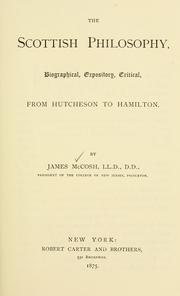| Listing 1 - 10 of 83 | << page >> |
Sort by
|
Book
ISBN: 1412373441 Year: 2010 Publisher: Chicoutimi : J.-M. Tremblay,
Abstract | Keywords | Export | Availability | Bookmark
 Loading...
Loading...Choose an application
- Reference Manager
- EndNote
- RefWorks (Direct export to RefWorks)
Book
Year: 1885 Publisher: Edinburgh and London : Blackwood,
Abstract | Keywords | Export | Availability | Bookmark
 Loading...
Loading...Choose an application
- Reference Manager
- EndNote
- RefWorks (Direct export to RefWorks)

ISBN: 0404592546 Year: 1980 Publisher: New York (N.Y.): AMS
Abstract | Keywords | Export | Availability | Bookmark
 Loading...
Loading...Choose an application
- Reference Manager
- EndNote
- RefWorks (Direct export to RefWorks)
Book
Year: 1907 Publisher: Edinburgh : W. Blackwood,
Abstract | Keywords | Export | Availability | Bookmark
 Loading...
Loading...Choose an application
- Reference Manager
- EndNote
- RefWorks (Direct export to RefWorks)
For the inauguration of a philosophical Lectureship-the first of its kind in a Scottish University-no subject appeared, for various reasons, more appropriate than a critical review of Scottish philosophy. Other grounds than the obvious one of national patriotism were present to my mind in choosing this subject; for at the first blush there is a savour of superfluity in discoursing on Scottish philosophy to a Scottish audience. This, however, is perhaps hardly so much the case as might be supposed. The thread of national tradition, it is tolerably well known, has been but loosely held of late by many of our best Scottish students of philosophy. It will hardly be denied that the philosophical productions of the younger generation of our University men are more strongly impressed with a German than with a native stamp.
Periodical
ISSN: 27533298 Year: 2008 Publisher: Aberdeen : Centre for Scottish Thought, University of Aberdeen
Abstract | Keywords | Export | Availability | Bookmark
 Loading...
Loading...Choose an application
- Reference Manager
- EndNote
- RefWorks (Direct export to RefWorks)
Philosophy, Scottish --- Philosophy, Scottish. --- Scottish philosophy
Book
ISBN: 1399500929 1399500937 1399500902 1399500910 Year: 2023 Publisher: Edinburgh : Edinburgh University Press,
Abstract | Keywords | Export | Availability | Bookmark
 Loading...
Loading...Choose an application
- Reference Manager
- EndNote
- RefWorks (Direct export to RefWorks)
Beginning with Sir William Hamilton's revitalisation of philosophy in Scotland in the 1830s, Gordon Graham takes up the theme of George Davie's 'The Democratic Intellect' and explores a century of debates surrounding the identity and continuity of the Scottish philosophical tradition. Graham identifies a host of once-prominent but now neglected thinkers - such as Alexander Bain, J.F. Ferrier, Thomas Carlyle, Alexander Campbell Fraser, John Tulloch, Henry Jones, Henry Calderwood, David Ritchie and Andrew Seth Pringle-Pattison - whose reactions to Hume and Reid stimulated new currents of ideas.
Book
ISBN: 0198803621 9780198803621 Year: 2017 Publisher: Oxford: Oxford university press,
Abstract | Keywords | Export | Availability | Bookmark
 Loading...
Loading...Choose an application
- Reference Manager
- EndNote
- RefWorks (Direct export to RefWorks)
Book
Abstract | Keywords | Export | Availability | Bookmark
 Loading...
Loading...Choose an application
- Reference Manager
- EndNote
- RefWorks (Direct export to RefWorks)
Book
ISBN: 1283692783 184540453X 1845404548 9781845404536 9781845401603 1845401603 Year: 2012 Publisher: Exeter, UK Charlottesville, VA Imprint Academic
Abstract | Keywords | Export | Availability | Bookmark
 Loading...
Loading...Choose an application
- Reference Manager
- EndNote
- RefWorks (Direct export to RefWorks)
Thomas Reid (1710-1796) is the foremost exponent of the Scottish 'common sense' school of philosophy. Educated at Marischal College in Aberdeen, Reid subsequently taught at King's College, and was a founder of the Aberdeen Philosophical Society. His Inquiry Into the Human Mind on the Principles of Common Sense was published in 1764, the same year he succeeded Adam Smith as Professor of Moral Philosophy at the University of Glasgow. He resigned from active teaching duties in 1785 to devote...
Book
Abstract | Keywords | Export | Availability | Bookmark
 Loading...
Loading...Choose an application
- Reference Manager
- EndNote
- RefWorks (Direct export to RefWorks)
| Listing 1 - 10 of 83 | << page >> |
Sort by
|

 Search
Search Feedback
Feedback About UniCat
About UniCat  Help
Help News
News